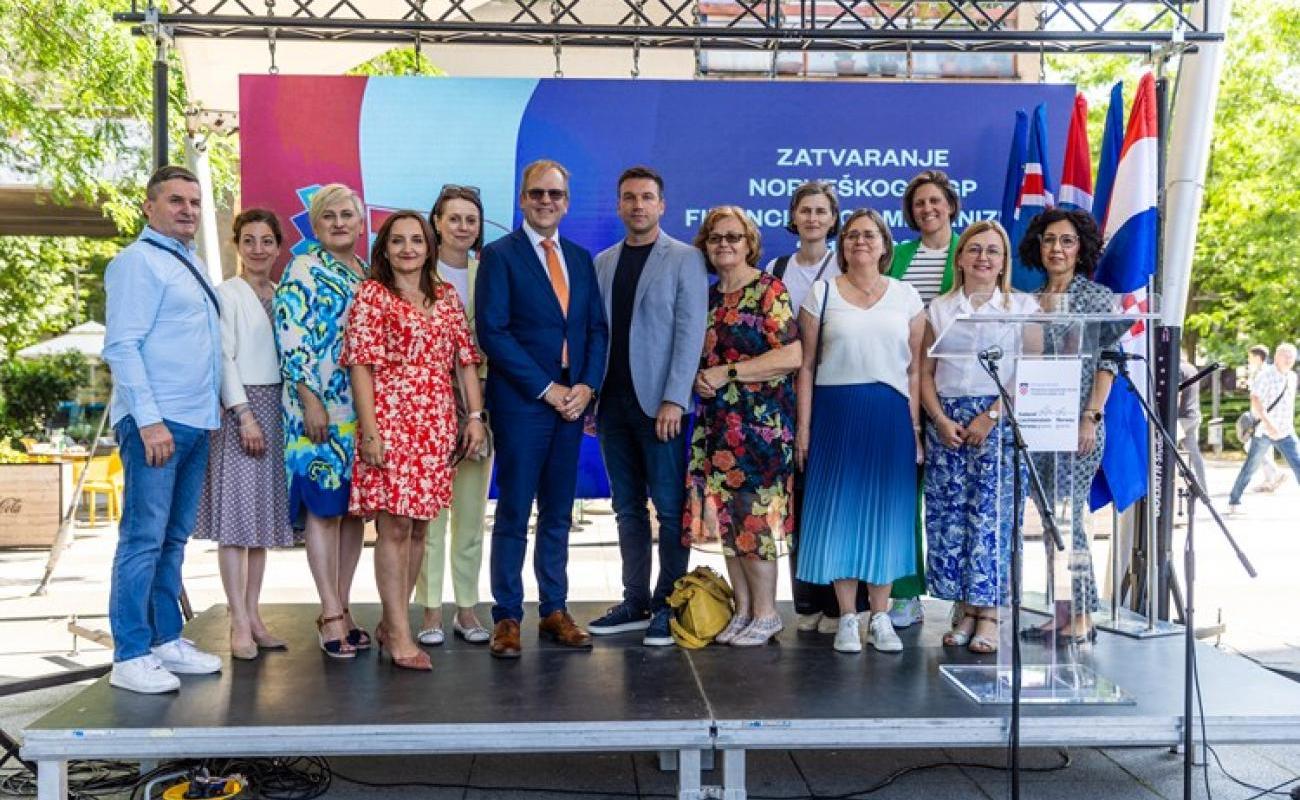EUR 103.4 million invested in Croatia through the European Economic Area Financial Mechanism and the Kingdom of Norway Financial Mechanism 2014-2021

The closing event in Osijek presented successfully implemented projects.
"More than 100 million euros of funds have been invested in cooperation with our partners from Norway, Iceland and Liechtenstein in Croatia, so that we could have a scientific center in Josipovac behind the observatory, which was unthinkable until recently, so that we could have a similar center in Ludbreg. We also have a large well for geothermal sources in Bjelovar, a new court in Split, but this is only part of the projects that we have implemented in cooperation with our partners," said State Secretary at the Ministry of Regional Development and EU Funds, Domagoj Mikulić, at the closing event of the EEA and Norwegian Financial Mechanisms 2014 - 2021 in Osijek, emphasizing that this story does not stop there, but continues. "We are currently in the final phase of negotiations with our partners, so that we can continue to develop projects at this pace in the next financial perspective, both in Croatia and in Osijek-Baranja County," added State Secretary Mikulić.
“In today’s world, small countries like ours must act thoughtfully and cooperate. Faced with challenges such as climate change, social inequalities and external pressures, no country can act alone. For Norway, cooperation is not just a strength - it is a necessity. The EEA and Norway Grants reflect this approach, not only as financial support, but as instruments for lasting change. Norway’s and the EEA Grants go beyond bricks and concrete - they are about investing in partnership, solidarity and a shared future. Brick by brick, project by project, we are building not just buildings, but lasting relationships,” said Helge Klouman Marstrander, Deputy Ambassador of the Kingdom of Norway to Croatia.
For the period 2014-2021, Croatia had EUR 103.4 million available through the programmes Local Development and Poverty Reduction, Energy and Climate Change, Justice and Home Affairs, Civil Society, Social Dialogue, Innovation, Research, Education and Competitiveness and the Bilateral Fund.
In the area of local development, significant results have been achieved through projects that have improved the skills and competences of students and teachers, modernized STEM classrooms, established four Regional Science Centers, and ensured greater accessibility to education for children with disabilities. More than 9,000 students participated in STEM courses and programs, and more than 1,600 teachers and primary school staff improved their knowledge through various educational activities and workshops. In the area of justice, the most visible and significant achievement is the new building of the Municipal Court in the center of Split, which has improved access to justice for the citizens of Split and the surrounding
area. Probation offices in Zagreb, Rijeka, Sisak, Split, Požega, Osijek, and Bjelovar have been renovated and renovated, improving probation, which is now better equipped and qualified to fulfill its role. Mediation as an alternative to resolving court disputes has also been improved, and judges have been further empowered through international training. Projects under the Energy and Climate Change programme have contributed to a better quality of life for Croatian citizens by creating a cleaner environment, strengthening energy security and resilience, reducing costs in public institutions and buildings, and increasing energy awareness.
At the final event, visitors had the opportunity to learn more about the results of projects and programs implemented through the financial mechanisms of the EEA and the Kingdom of Norway 2014-2021 in Croatia through an interactive and entertaining program adapted to all age groups. Representatives of the K9 teams from the Croatian Mountain Rescue Service, who conducted two projects focused on search and rescue from ruins with search dogs, participated in the information stands, among others. Representatives of the Faculty of Science, University of Zagreb, who conducted a project on geophysical and seismological research in earthquake-affected areas in the Republic of Croatia, demonstrated equipment for determining the source and effects of earthquakes, and visitors were also able to try out bracelets for monitoring defendants/convicts who have been issued special measures prohibiting them from leaving their homes, which were purchased as part of the project "Strengthening the protection of human rights and public safety through improving the capacities of the probation service".
The event also included a visit to two projects financed under the EEA and Norwegian Financial Mechanisms 2014-2021: the Regional Science Center of Pannonian Croatia and the Probation Office in Osijek.
In Josipovac Punitovački, the event participants visited the Regional Science Center of Pannonian Croatia, located in the Josip Kozarac Elementary School, which has an observatory and planetarium, where, thanks to an application connected to numerous telescopes around the world, children can monitor changes in the sky not only in the Croatian sky but also around the world.
The Probation Office in Osijek was renovated with funds from the Norwegian Financial Mechanism, which enables better working conditions and functionality of the probation service itself in this area.
More information can be found at www.eeagrants.hr
